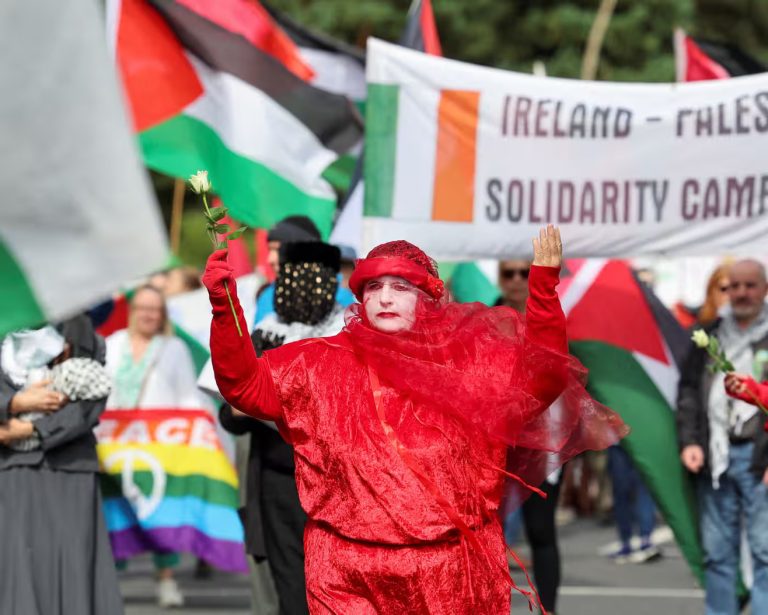Originally meant to mock Ireland’s support for Palestine, the term has instead been embraced as a symbol of pride — now featured on T-shirts, hoodies, badges, and across social media profiles. Welcome to “Paddystine,” home of the self-declared “Paddystinians.”
Irish pro-Palestine activists have turned the label into a unifying slogan in their protests against Israel’s war in Gaza, using it to urge the Irish government to take stronger action to help end the conflict.
The belief that the word began as a slur from pro-Israel voices has only fueled its popularity, especially on platforms like TikTok, where Irish users proudly call themselves “Paddystinians.” Some have even coined a playful variation, “Biddystinians,” reclaiming the old-fashioned name “Biddy” in a new political context.
“It was meant as a put-down,” said Ross McGann, a TikToker with close to 40,000 followers. “But when I heard it, I thought, ‘No — we can turn this around.’ That’s a very Irish response — take an insult and spin it into something powerful.”

The 35-year-old content creator, who lives on a farm in County Offaly, has proudly incorporated the term “Paddystinian” into his TikTok bio and videos — many of which have gone viral. “The word ‘Paddy’ has been used against Irish people as a slur,” he said, “but in my family, with so many named Patrick, it’s always been a positive. Given the situation in Gaza, I felt it was right that we reclaim it.”
The rise of the term has added a distinctive voice to Ireland’s pro-Palestinian movement, emerging alongside other headlines — such as controversy over the Belfast rap group Kneecap, one of whose members is facing a terrorism charge, and whose Glastonbury appearance is now in doubt. The exact origin of “Paddystinian” is unclear, but many first encountered it in December when Israel shuttered its Dublin embassy in protest over what it claimed was Irish government antisemitism and extreme hostility. Online, some pro-Israel voices coined the term by merging “Paddy” and “Palestinian,” aiming to criticise Ireland’s recognition of Palestinian statehood and its calls for the EU to adopt a tougher line on Israel — framing it as support for Hamas.
Ben Cohen, a columnist for the Jewish News Syndicate, initially regretted using the term in jest, noting that “Paddy” was a dated stereotype associated with drunkenness and other Irish tropes. “As it turns out, I needn’t have worried,” he later wrote. “#Paddystinian was being enthusiastically taken up by Irish supporters of Hamas.” He described much of the content under the hashtag as “obnoxious or downright stupid,” mocking claims that Ireland is antisemitic.
But within Ireland, the term has taken on a different life. Zoë Lawlor, chair of the Ireland Palestine Solidarity Campaign, said the phrase was quickly reclaimed. “It started as an insult. People here found that hilarious, so we flipped it. It became something fun — we chanted it, changed our Twitter handles, and really made it our own.”
Now, “Paddystinian” appears on badges, shirts, pins, and more — often sold to raise funds for Gaza. The campaign group Uplift is one such seller, donating profits to humanitarian aid. In Cork, Izzeddeen Alkarajeh, a Palestinian restaurateur at Izz Cafe, offers “Paddystinian” pins that have become top sellers. “It’s a perfect example of how a slur can be reclaimed and redefined by the people it targets,” he said.
The term has resonated especially with younger generations, raising awareness of the Gaza conflict and the broader struggle for Palestinian rights. Alkarajeh said the Kneecap trio even visited his cafe in February. “Ireland has always stood with the oppressed, and that solidarity is shining through now more than ever.”
Jilan Wahba Abdalmajid, the Palestinian ambassador to Ireland, praised that support. “Any bond between the Irish and Palestinian people is a positive one,” she said. “We both share histories of colonisation, so we understand how deeply freedom, justice, and human rights matter.”
Activists say their focus now is on turning viral support into policy change. They are pushing the Irish government to go beyond strong words by passing legislation banning trade with illegal Israeli settlements, blocking Israeli bond sales via the Irish central bank, and preventing Irish airspace from being used for flights suspected of transporting military aid to Israel.
“Our main pressure point is the government,” said Lawlor. “They’ve made bold statements — now it’s time to back them up. If Ireland takes real action, it could spark a broader shift across the EU.”

